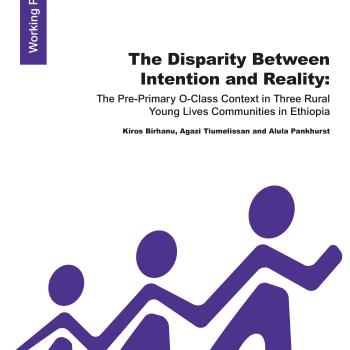
This Working Paper explores the provision of a one year preparatory pre-school 'O- Class' in rural communities in Ethiopia. Although the 1994 Education Policy highlighted the importance of kindergarten education, early childhood education was restricted to urban areas. The National Early Childhood Care and Education Policy Framework in 2010, led to improved access to pre-primary education especially in rural areas, through the provision of a one-year preparatory O-Class. However, inequalities and disparities in access persist.
The authors based their analysis in the paper on data collected in three Young Lives communities. They found that despite community members and service providers being aware of the benefits of pre-primary school proision and improved access in recent years, there is a lack of appropriate teaching aids, suitable classroom infrastructure and play equipment and materials. Furthermore, there is a shortage of trained facilitators, and those working lack motivation due to poor salaries and benefits.
The paper recommends improvements in the provision of teaching aids, classrooms, play materials, and the skills and motivation of facilitators and points to the need for better monitoring and evaluation so that local priorities are identified and addressed.

This Working Paper explores the provision of a one year preparatory pre-school 'O- Class' in rural communities in Ethiopia. Although the 1994 Education Policy highlighted the importance of kindergarten education, early childhood education was restricted to urban areas. The National Early Childhood Care and Education Policy Framework in 2010, led to improved access to pre-primary education especially in rural areas, through the provision of a one-year preparatory O-Class. However, inequalities and disparities in access persist.
The authors based their analysis in the paper on data collected in three Young Lives communities. They found that despite community members and service providers being aware of the benefits of pre-primary school proision and improved access in recent years, there is a lack of appropriate teaching aids, suitable classroom infrastructure and play equipment and materials. Furthermore, there is a shortage of trained facilitators, and those working lack motivation due to poor salaries and benefits.
The paper recommends improvements in the provision of teaching aids, classrooms, play materials, and the skills and motivation of facilitators and points to the need for better monitoring and evaluation so that local priorities are identified and addressed.

